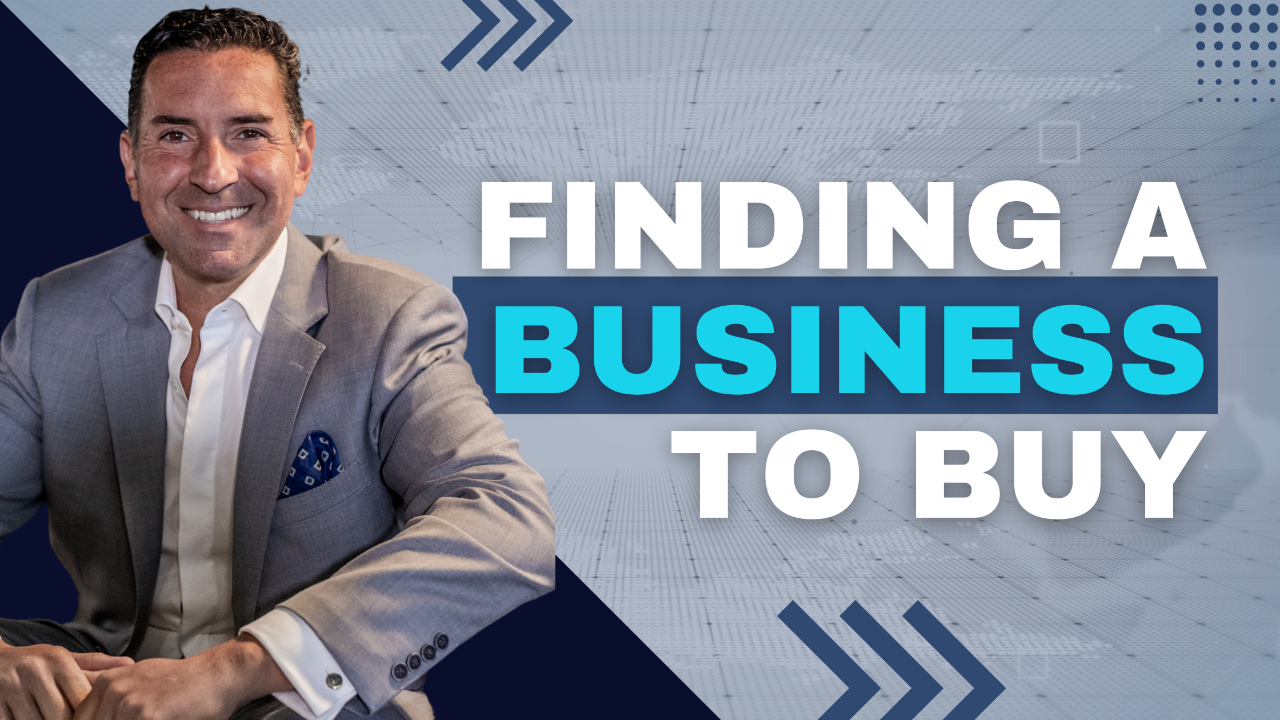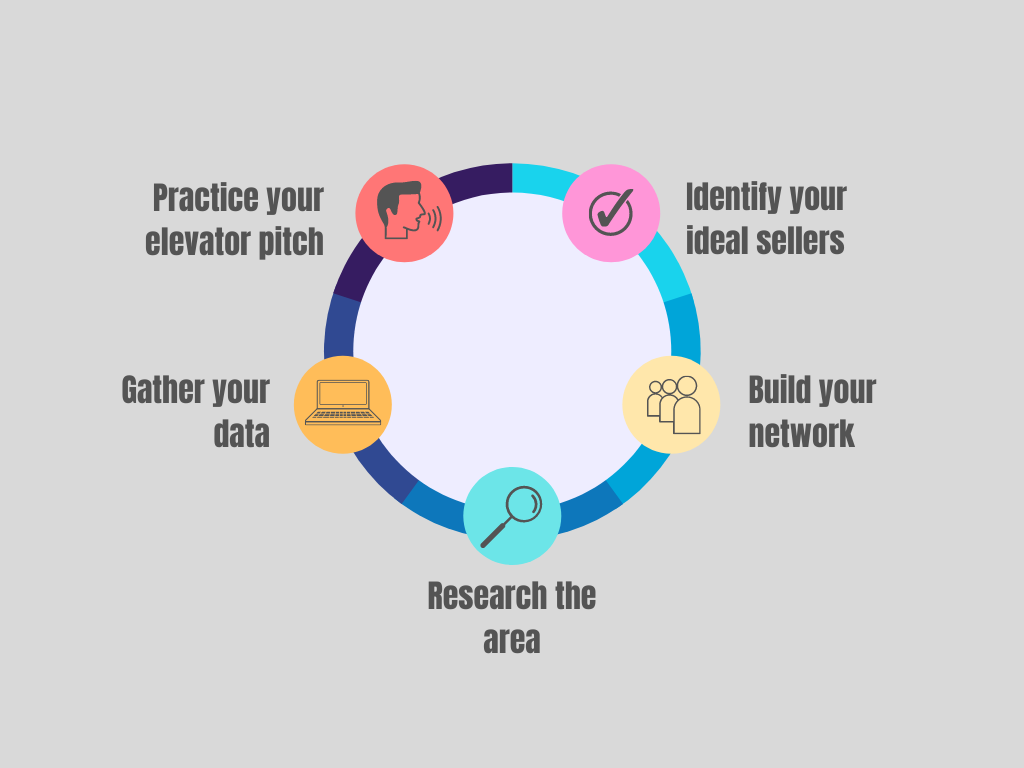Finding a Business to Buy: Here's How to Start

As we mentioned previously, approximately 2.5 million businesses are for sale. That can be both an exciting and overwhelming prospect: Exciting because it feels like there are a lot of opportunities to be had. Overwhelming because where does one even begin when dealing with numbers like that?
Hopefully, you followed our advice in this post and have already identified the type of businesses you’re interested in buying. (If you haven’t yet, we encourage you to pay it a visit before moving forward.) Once you’ve done that, you can automatically ignore anything that falls outside of that criteria.
And once you know WHAT you want to buy, now comes the task of FINDING it. And because it’s unlikely it will just fall into your lap (real life isn’t an episode of Shark Tank, unfortunately), it will require some time, energy, and patience.
In this article, we will lay out a roadmap of sorts to provide some clarity and direction on how to find the businesses you want to buy.

Perfect Your Statement of Intent
It’s time to craft your elevator pitch. Doing so will: A) Ensure you yourself know exactly what it is you’re looking for, and B) Will ensure that message is communicated clearly and efficiently.
Take some time to review these questions and write down your answers. Then practice, practice, practice! You don’t want to go into conversations sounding overly rehearsed or robotic, but you also don’t want to be flubbing around for answers and give off the impression you have no idea what you’re talking about.
- Be specific about what you’re looking for: Industry, revenue, location, etc.
- Give them your why: Why are you looking to purchase a business?
- Explain how you can help: Show that you can offer a solution to someone looking to retire or sell.
- Show them proof: What makes you the right person to buy this business?
- Present your ask: What do you want from them?
Need some help learning how to communicate? Check out this episode of The Liquid Lunch Project Podcast with Steve Sims.
Not All Sellers Are Created Equal
Know the sellers you want to target. Time is money, and you don’t want to waste yours on ones that aren’t going to be able to deliver what you’re looking for.
An ideal seller will fall into one or more of these categories:
- Ready to retire
- Tired of being in business or burnt out
- Looking for a different opportunity
- Has no successor to take over the business
- More concerned with protecting their legacy/clients/employees than profit
This type of individual will more likely be motivated to sell, and you’ll not only get a better deal, but you’ll also be providing them a much-wanted out. Win-win.
A less-than-ideal seller will fall into one or more of these categories:
- Highly successful
- Young and energetic
- Still engaged and having fun with what they do
- They do not need to sell
Clearly, this type of individual will be far less motivated to sell their business, so it’s probably not the wisest investment of your time and energy to convince them otherwise.
With these criteria in mind, you can stay laser-focused on both the business and seller that will deliver what you want and avoid detouring down a path that leads to a dead-end.

Build Your Network
A strong network is an invaluable resource to help you make connections, trade ideas, meet like-minded people, and promote socialization. And particularly when you’re ready to buy a business, tapping into this resource will get your name out there and connect you with those who may be in a position to help. While the term “networking” may conjure up images of schmoozing with stuffy professionals or awkward conversations over bad wine at Happy Hour mixers, it’s really just about forming relationships and opening dialogue. There are plenty of different ways to approach it - and most are completely free!
- Who do you already know? Reach out to family, friends, colleagues, and neighbors. Go through the contact list on your phone or your address book. Send emails, make calls.
- Tap into the power of social media. Facebook, LinkedIn, Twitter. Ask for recommendations, join Facebook groups, share content, and build your following.
- Join Mastermind Groups
- Get plugged into local Chambers of Commerce or Associations.
- Spend time volunteering
- Have conversations with “those in the know”: Accountants, bankers, financial advisors.
There’s no right or wrong way to build your network; you can use one or all of these techniques. Some will come more naturally than others, so lean into your strengths and capitalize on those that give you a better ROI.
Explore the Area
In addition to networking efforts, you should also spend time hitting the pavement (literally and figuratively) and be proactive in your search for businesses to buy.
- Utilize sites like ZoomInfo.com or BizBuySell.com to search local and national listings
- Get to know the neighborhood where you’re thinking of buying a business. Drive around, walk the streets, and get to know the community. Use Google maps to get familiar with the lay of the land.
- Chat with owners. Just because there isn’t a For Sale sign in the window doesn’t mean it’s off the table.
- Look at your spending habits. What are some of the businesses you love? What places are you already frequenting?
Start making lists. Take note of which opportunities excite you most or if there seem to be any recurring themes.
Dig In
Over time you should hopefully develop a pretty healthy list of viable businesses to consider. Once that happens, you’re ready to start digging in for a closer look.
- Set a goal to look at X number of businesses. You can really make this any number you want, but keep it realistic and doable. Somewhere in the 30-40 range is a good place to start.
- Make a spreadsheet and gather your data. Compiling all the facts and figures into one place will help you comparison-shop between all the different options on the table.
- Remember to be as specific as possible. Your criteria should whittle that list down to a more manageable number of business owners you’ll actually want to spend time in serious conversation with. (In this case, smaller is better!)
- Once you’ve narrowed it down to your top 3 or 5 picks, you’re ready to set up the meetings and take action.

Some Final Thoughts
When beginning your search, don’t get hung up on doing it perfectly or following these steps line-by-line; it’s not a 1-2-3-DONE process. You’re going to find that a lot of it will evolve organically over time. Your network will continue to grow; you’ll meet new people and be presented with opportunities you wouldn’t have considered before. Your sphere of influence will expand, and you’ll discover new interests. Stay focused, but be flexible. You never know where or when your next great deal will present itself.



